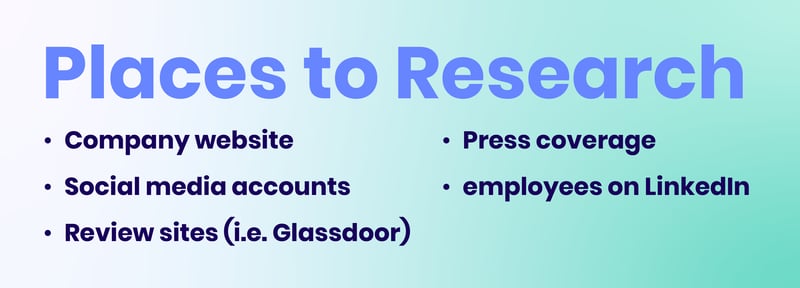When you’re invited in for an interview with a company, you’re evaluating the company just as much as they’re evaluating you. This is your opportunity to ask questions about the company culture and see if the position aligns well with your personal and career goals.
Not only that, a recruiter or hiring manager expects you to do your research on the company. Doing the research shows your interest in the company, passion for the role and your commitment to your own success. It also shows that you understand the company’s culture and outlook and that you believe you are a good fit for both.
Because your interview time will be limited, it’s important to learn as much as you can about the company before your interview. Researching the company ahead of time will give you a good general idea of the company’s mission, values and culture. You can then use your precious interview time to ask specific follow-up questions to what you’ve already learned.
👉 The feeling’s mutual: 60% of hiring managers use social media to research candidates before an interview. Smart recruiters will definitely try to learn a bit more about you before your interview, so you shouldn’t feel strange about learning everything you possibly can about the company you’re interviewing with.
How to research a company
A great place to begin is the job posting. Typically, it will include a paragraph or two that describes the company. Don’t stop there! This is just a high level overview of what the company does, but there’s so much more to learn about a company before heading in for an interview.
👉 If you don’t know what company the role is for, your recruiter should disclose that on the first phone screen. If you know who they are and what they do—great! Express your excitement. If not, show your enthusiasm to learn more about them.
Next, head over to the company’s website to understand the customers they serve as well as the company's corporate positioning. Look at the types of images and the words used on the homepage to understand how the company speaks to its customers. This can give you an indication of their ideal target market.
Then, head to the corporate section of their site. Look for an “About” page in the main navigation on the site, or scroll down to the footer of the site and look for links that say “About,” “Mission and Values” or “Team.”
Get a second opinion
Remember that these pages are written by the company in order to portray themselves in the best possible light. It’s important to get a second opinion! You can take a look at:
🔎 The company’s social media accounts: Pay attention to the comments from followers and how the company responds.
⭐ Glassdoor and similar review sites: These sites allow current and former employees to post reviews of their employment experience. Take these with a grain of salt as employees with negative experiences are much more likely to take the time to share a review than those who are happily employed.
🗞️ Press coverage: You can review the Press page on the company’s website, or do a Google News search for the company name and see what comes up. Are the media mentions positive or negative?
👩💼 Employees on LinkedIn: The types of updates these employees share can give you valuable insight into the company’s top priorities, and you can also get a sense of the work-life integration these employees feel they have.
What to look for
In addition to educating yourself on what the company does, what industry they’re in and how your role would serve their customers and/or employees, researching a company is a great way to understand more about their corporate culture.
Look for what the company says about their:
- Mission: This is why they do what they do.
- Values: These are their guiding principles.
- Company culture: Companies that heavily invest in their people’s development and work-life integration proudly share their initiatives.
- Recent accomplishments: Look for recent awards, accolades and press coverage to get a sense of the latest news.
- Company history: This can give you additional insight into their culture. Are the founders still active within the company? Has the company recently been acquired or made a significant acquisition? These things can all help you predict the stability of the future of the company.
Go beyond the company
In addition to understanding everything you can about the company’s business model, you should also take some time to learn a little more about the industry. If you’re already familiar with the industry, learn more about this company’s position in the industry and their main competitors. What is the company’s unique perspective in the industry, and do any of your skills or experience specifically line up with this?
If you’re not familiar with the industry, perform a crash course by learning:
- Who the industry serves
- The largest companies in the industry
- The biggest challenges in the industry
- The largest areas of growth
Top secret tips
Sometimes, the company’s actual name will not be shared in the job posting. If this is the case, typically the recruiter will disclose the company in your initial screening interview. Because this interview is usually very brief and focused primarily on the recruiter learning a bit more about your skills and experience, it’s okay if you aren’t prepared with specific questions just yet.
You can use this screening interview to confirm the specifics of the job - location, hours, schedule, employment status, reporting structure, etc. In your second interview, which will typically be more involved and usually with a manager, you can begin to dig deeper into the company.
Set up for success
Now that you have a better understanding of the company’s mission, approach and business objectives, you can begin to picture yourself in your new role. Think about the top skills and experience you’d like to highlight during your interview, and consider how they can enhance the company’s mission and performance.
Prepare a few anecdotes that acknowledge one of the company’s recent accomplishments or main priorities, and then share the skills or experience you have that would allow you to continue moving the company forward in this area.
Learning about a company before your interview will help you position yourself as a top candidate who understands the company mission and the industry. By highlighting your most relevant experience, you can help the interviewer picture you performing well as part of the team. The more specific you can be, the better!
 Stand Out in Your Job Interview by Asking the Right Questions
Stand Out in Your Job Interview by Asking the Right Questions
Ask the right questions during your interview to leave a lasting impression that sets you apart from fellow job candidates.
Get support throughout your career journey
Access career opportunities with family-friendly employers, job search and career development resources, and a thriving community of moms, dads and allies with The Mom Project. 




